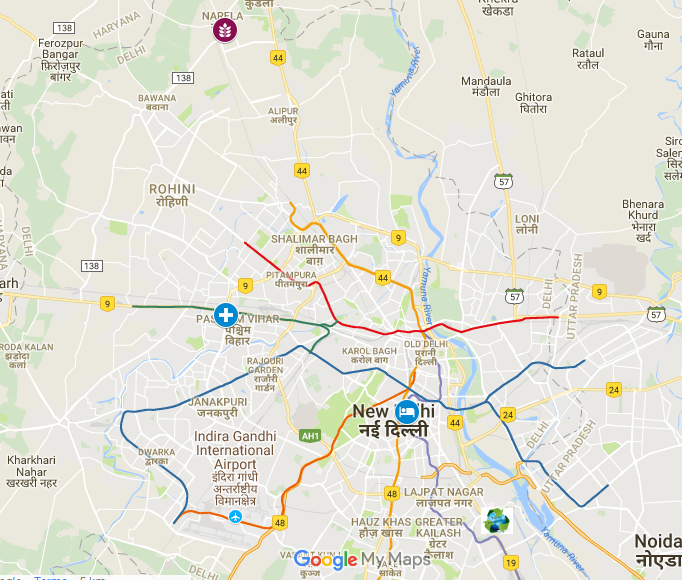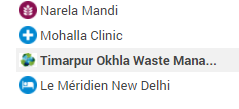The 2018 Summit will include a field visit to initiatives to experience first-hand some of the leading edge BoP business experiments in India. The field visit will serve to stimulate discussion and action during the Summit itself.
Field visits around the Delhi are planned under the BoP summit program. Field visits planned are in accordance with the themes of the summit. Identified 3 locations for field visit are as follows:
- Mohalla Clinic, Promoted by Delhi Government
Narela APMC market(Full Capacity)- Timarpur Okhla Waste Management Company ltd, promoted by JITF urban infrastructure ltd.
- Limited to 15 registrations for each
- Price ($50) – includes transportation, boxed lunch, service fees


| Site | Mohalla Clinic | Narela APMC | Timarpur-Okhla waste management site |
| Reporting Place | Hotel Le Meridien, New Delhi | Hotel Le Meridien, New Delhi | Hotel Le Meridien, New Delhi |
| Distance from Le Meridian Hotel | 18 KM | 42 KM | 12 KM |
| Reporting time | 10:30 AM | 12:00 PM | 13:00 PM |
| Journey Time | 75 Minutes | 120 Minutes | 60 Minutes |
| Arrival Time at Site | 12:15 PM | 14:30 PM | 14:30 PM |
| Time Spent at Site | 120 Minutes | 120 Minutes | 120 Minutes |
| Return Journey | 75 Minutes | 120 Minutes | 60 Minutes |
| Back at Le Meridien Hotel | 15:30 PM | 18:30 PM | 17:30 PM |
1. Mohalla Clinic
The Aam Aadmi Mohalla Clinic has been conceptualized as a model to provide quality primary health care services accessible to the communities in Delhi at their doorstep. The physical infrastructure of AAMCs has been envisaged in the form of pre-engineered insulated box yype re-located structures which are to be manufactured and installed through PWD. So far 105 Mohalla clinics have been opened in the Delhi. The plan is to grow it to 1000.
The clinics are mandated to provide following services:
- Basic medical care based on standard treatment protocols which include curative care for common illnesses like fever, diarrhoea, skin problems, respiratory problems etc., first aid for injuries and burns, dressing and management of minor wounds and referral services.
- All lab investigations carried out by the empanelled laboratory for the clinic.
- All drugs as per the essential drug list shall be provided free of cost to the patients.
- Preventive services such as antenatal and postnatal care of pregnant women, assessment of nutritional status and counselling and preventive and primitive component of National/State Health Programmes.
- Health information, education and awareness.
The clinics operate from 8:00 a.m. to 14:00 p.m. Monday to Saturday.
The group will be visiting the Mohalla clinic in Rajiv Gandhi JJ Punjabi Colony, which is a relief camp in Peeragarhi village of Delhi. It is one of the first Mohalla clinics started in Delhi.
2. Narella APMC Market
Each state which operates an Agricultural Produce Market Committee (APMC) has markets (mandis) established at different locations within the state. Farmers are required to sell their produce via auction at the mandi in their respective region. Traders require a license to operate within a mandi. Wholesale and retail traders (e.g. shopping mall owners) and food processing companies cannot buy produce directly from a farmer.
Some of the salient features of the APMC Model Act 2003 are as follows –
- Facilitate Contract farming model
- Special market for perishables
- Farmers, private persons can setup own market
- Licensing norms relaxed
- Single market fee
- APMC Revenue to be used for improving market infrastructure
The group will be visiting the Narela APMC market which also houses the biggest food grain market in Delhi.
3. Timarpur Okhla Waste Management Company Ltd.
Timarpur Okhla Municipal Solid Waste Management project is the first commercial waste-to-energy facility in India that aims to convert one-third of the Delhi garbage into the much-needed electricity, enough to serving 6 lakh homes. The project is CDM is registered with United Nations Framework Convention on Climate Change (UNFCCC) for earning carbon credits.
Key Highlights of the site
- Aimed at generating 16MW of power from waste, the power plant will use about a third of the daily municipal solid waste of Delhi, which stands anything between 6000 and 8000 tonnes per day.
- This project is registered with UNFCCC for earning carbon credits.
- Project cost estimated at Rs. 200 crore
- Project Model – BOOT (Build Own Operate and Transfer)
- NDMC and MCD will be providing the waste free of cost
- This initiative targets to bring electricity to more than 600,000 homes in India


